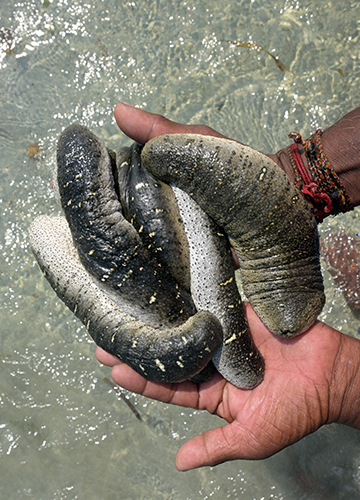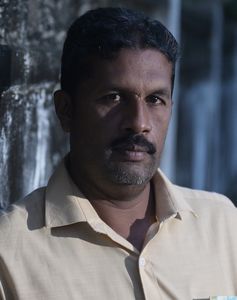The road from Jaffna to Poonakari in northern Sri Lanka offers a picturesque view. Flanked by lush green paddy fields, expansive farms, giant windmills and tall palms, the two-hour drive is a rewarding experience. The farms and the windmills disappear as the road takes a turn towards the scenic, Chinese-funded Sangupiddy bridge. Through Kilinochi and the dense Vanni forest, it finally reaches Kiranchi, a remote fishermen’s village. Catamarans and fishing nets lie scattered on the beach, and the sea looks calm. Two men atop a navy watch tower are scanning the horizon with their binoculars.
A few metres from the shore, a few thatched hutments dot the shallow waters. This is sea cucumber territory and the hutments belong to fishermen who watch over the farms. Sea cucumbers are echinoderms with a thick, wormlike body, having tentacles around the mouth. Star fish and sea urchins, too, belong to the same family. While a few varieties of sea cucumbers live in deep waters, most inhabit the shallows, like in Kiranchi. There are more than a thousand known species, but only about two dozen are commercially important. It is a delicacy in China and southeast Asia, and is also known for its medicinal properties.
“Everyone says sea cucumber farming is dangerous for marine life. But it is my livelihood,” says Seenianna Navarathnam, president of the fishermen’s association at Kiranchi. Navarathnam owns a one-acre farm, which fetches him at least ten lakh Sri Lankan rupees a year.
Sri Lanka’s sea cucumber fisheries is primarily artisanal and supports the livelihood of fishermen in the coastal region between Puttalam and Mannar in the Tamil-dominated Northern Province. Of the five districts in the province, Jaffna, Kilinochi and Mannar have shallow waters and are hubs of sea cucumber farming. According to official estimates, there are 720 farms in Jaffna, which were sanctioned after extensive debates and discussions among the local people and the government. And now 213 more applications await approval. In Kilinochi, there are 273 farms and 274 pending applications. In Mannar, already 159 acres are under cultivation, while 204 applications are pending.
“This is one of the major sources of income in the Northern Province. The fishermen here are just workers. The farms are owned by doctors, lawyers and several corporates who live in Colombo or elsewhere,” says Thusiyan, an employee working in one of the farms. Thusiyan used to work on a farm at Kautharimunai in Jaffna, where China had set up its first farm. “Some of the farms there are closed now, including the Chinese farm,” says Thusiyan. “There was strong opposition from local people against the Chinese farms at Kautharimunai as it has a huge impact on fishing. We feel the Chinese chose the place because it is deserted and also because of its proximity to India,” said Kilinochi MP Shritharan Sivagnanam.
Kautharimunai is just 54km from Rameswaram and it takes only 20 minutes to cross the sea in a twin-engine fibreglass boat. “It is easy to watch the Indian shores from Kautharimunai,” says Sivagnanam. As an MP, he has been fighting against the mushrooming sea cucumber farms in his constituency. “The farms are increasing by the day in places like Kiranchi, Poonakari and the coastal areas in Kilinochi. It is harmful to our ocean environment,” he says. He blames the government for not offering any support to the Tamils in the Northern Province. “I have been raising it in parliament. The government is not supporting the people in any way except for the sea cucumber farms.”
China has a huge hatchery at Ariyalai in Jaffna called the Gui Lan farm. It has supplied over five lakh sea cucumber seedlings to local farmers, free of cost. The baby sea cucumbers are nursed in the farm and then sold to commercial farms. “We get seedlings from these hatcheries. Sometimes we get it from our own farm. But it has to be carefully harvested. Otherwise, it dies very soon,” says Mahendran Arithu, who owns a one-acre farm in Kiranchi.
No special gear or net is needed to harvest sea cucumbers. It is harvested by hand by scuba divers or skin divers. “The sea cucumbers eat mud and move down into the mud deep inside the shallow waters. We dive in and check them every day. If they move into the sea, we bring them back into the shallow waters,” says Yusuf Francis, president of the Poonakari cooperative fishermen federation. Within three to four hours of harvesting, sea cucumbers are brought to the factory for processing. “If it gets delayed, the intestine will come out and it gets spoiled,” says Thileepan, who works in one of the factories. War widows and elderly women are employed by many factories to clean the catch. “This is the major source of livelihood for women in this region,” says the factory supervisor.
In 2021, Sri Lanka exported around 336 tonnes of sea cucumber to China, Singapore, and Hong Kong. Sea cucumber fetches around €250 per kilogram in the export market. Some of the rare varieties are sold even for €2,500 per kilogram. The farmers get up to 1,000 Sri Lankan rupees for 50gm. It has become an important source of income for fishermen in the north, east and the northwestern coastal regions.
In June 2022, the Sri Lankan government approved a proposal for a sea cucumber farm spanning 5,000 acres in Jaffna, Mannar, Kilinochi and Batticaloa districts. According to the National Aquaculture Development Authority, sea cucumber export has brought in considerable amount of foreign exchange. “There has been much opposition. But it is the livelihood of most fishermen in our country. It is for exports. We set up the farms only after thorough research,” says Fisheries Minister Douglas Devananda, who is an MP from Jaffna.
While sea cucumber farming supports more than two lakh families in the northern and eastern provinces, there is stiff opposition to it. “These farms will hurt fish reproduction. Sea cucumber is only for export and it is not for our own primary marine industry business. It will destroy our traditional fishing industry, which has been the source of our livelihood for generations,” says Annalingam Annarasa, leader of a Jaffna-based fishermen’s association.
Annarasa does not mind the Chinese presence, as he is concerned only about the marine environment. In fact, he says China has been quite benevolent towards local fishermen. “The Chinese gave 150 litres of fuel each to two lakh families. In the Northern Province alone, 27,000 families have benefitted,” says Annarasa. China also has plans to distribute fishing nets.
Devananda, too, does not appear bothered by China. “More than the sea cucumbers, our fishermen are facing a bigger damage from the trawlers used by Indians,” says Devananda. “We need to support our fishermen. We need technology and investment to support our people in the Northern Province.”
Interestingly, the Sri Lankan fishermen who earn their livelihood by selling sea cucumbers have never tasted it all these years. “We cannot eat this,” says Edward, a 43-year-old fisherman from Poonakari. “It looks disgusting. You won’t find this in our markets. Only the Chinese can eat this.”





